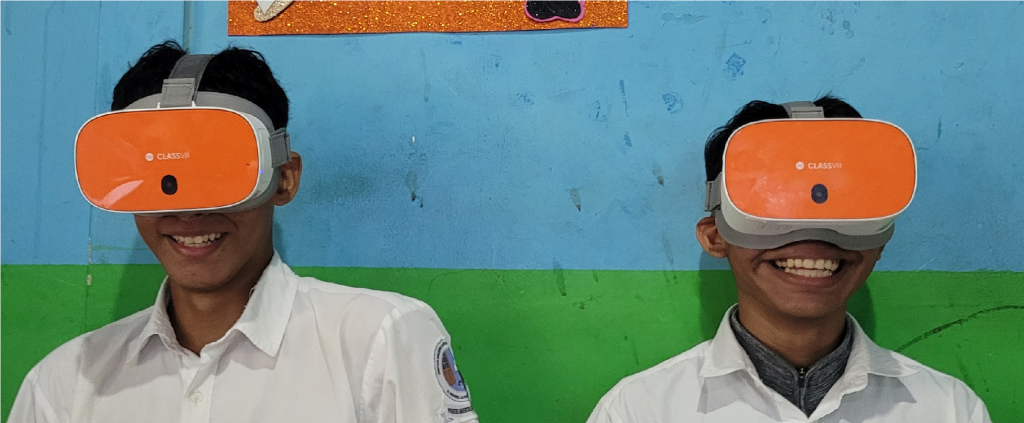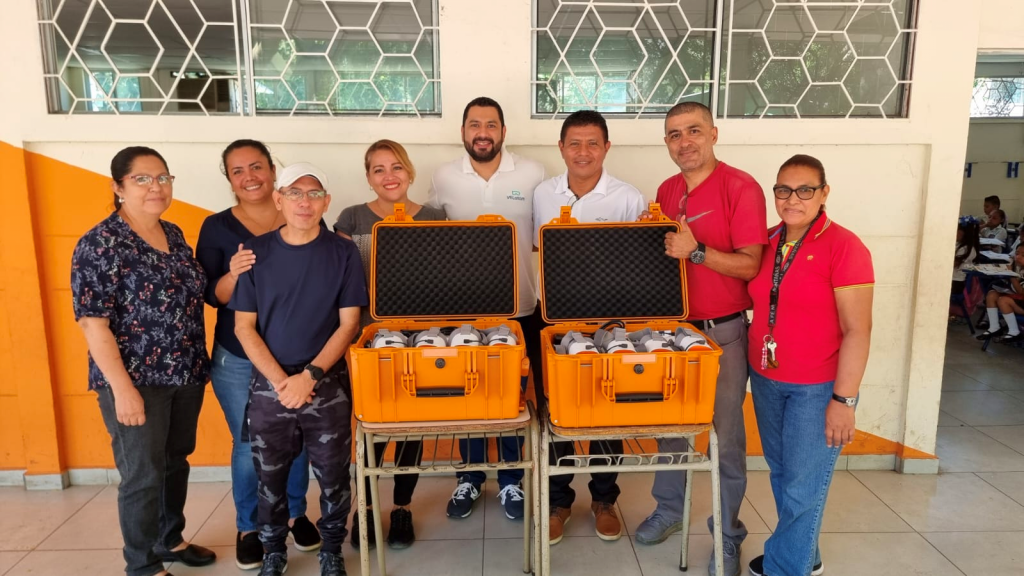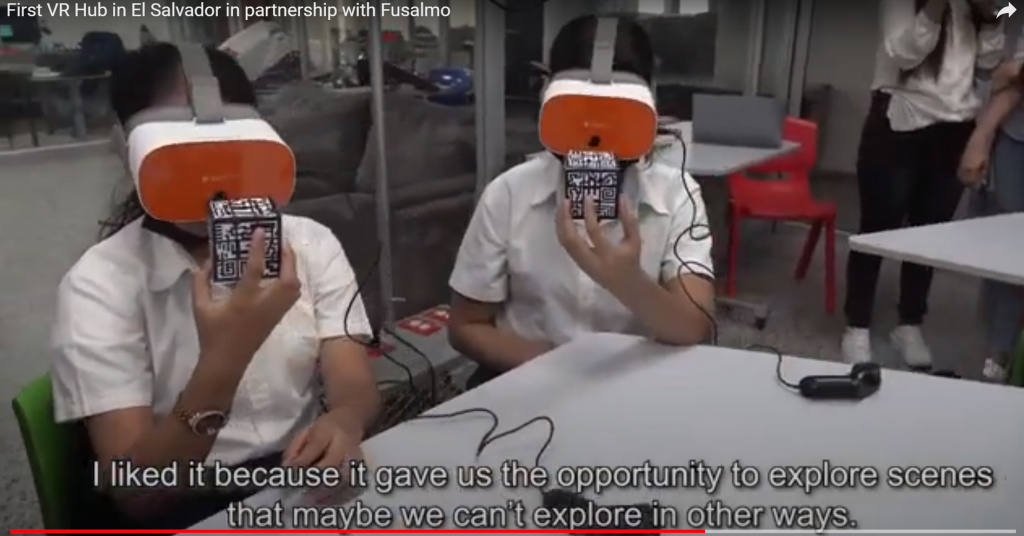
El Salvador is committed to reducing technological gaps and is being hailed as the next Silicon Valley. Every child has a digital device and there are exciting virtual reality projects that are raising achievement and reducing the drop out rate.
Known as ’El pulgarcito’ or the Tom Thumb of America, El Salvador is the smallest country in the Americas and is currently rated as the safest place on the continent. In May 2023, El Salvador’s president, Nayib Bukele, introduced a law to eliminate all taxes on technology innovations, software and app programming, AI, computer and communications hardware manufacturing. The law is expected to boost the country’s technology sector, generate more jobs for its population, and attract foreign investment.
In September 2023, the government signed the General Law for the Digital Modernisation of the State with Google Cloud to speed up digital transformation in education, health, and public services. This historic agreement is the first of its kind in Central America.
El Salvador’s Digital Education Revolution
Public education in Latin America faced three major challenges: ‘reducing technological gaps, maximizing the educational trajectory of the most disadvantaged students, and ensuring that education generates employable and productive learning outcomes’. In the UK we would describe this as Bridging the Digital Divide but currently there are no signs that we would carry through ambitious plans involving tax breaks and changes to the law.
To make things happen, schools would need ‘access to stable and sufficient internet’. Learners would need smart devices and teachers would need training to make the most of the new digital opportunities. ‘It’s like another dimension for them; it’s going to be a boom, something really relevant (…) it’s really going to attract perhaps more students to schools and those students who have been left behind with the pandemic,’ said Aida Elizabeth Hernández Rivera, Principal – Educational Center Vuelta de Oro.
Tax Breaks Fuelling Tech Growth
El Salvador has increased the education budget from 3.1 percent of the country’s gross domestic product (GDP) to 5.1 percent. Now El Salvador is the only country in the region where every child has their own device.
- Laptops and tablets have been distributed to all students from early years to the end of high school
- There is also a free internet package which can be used with a provider chosen by the family
- The device comes preloaded with more than a dozen educational apps so that children can learn while having fun
The government is committed to reducing technological gaps and has also distributed specially adapted computers for students with disabilities. ‘Before being egalitarian, public policy must be equitable, and those who need more must be given more. The equipment for children with some type of disability triples the value of the computers we give to children without disabilities,’ said The Minister of Education, Mauricio Pineda.
Case study 1: The VR HUB
The first VR HUB in Central America was established: A virtual and augmented reality learning centre using Avantis Education’s CLASS VR technology as a teaching platform. Avantis is a UK company with headquarters in Gloucestershire. It supplies user-friendly technology to more than a million students in over 90 countries.
The Fundación Salvador del Mundo (FUSALMO) and The VR Latam training and adoption team worked with 12 schools reducing technological gaps in deprived areas. Between them, they trained over 40 volunteers and teachers, created a total of 176 hours of VR science classes and 67 hours of VR life skills classes which were delivered to more than 700 students from sixth, seventh, eighth, and ninth grades

An impact study looked at science classes with and without VR, to measure knowledge retention and motivation:
- 10.4% more of the group who used VR passed a knowledge test
- The VR group got 8.7% more correct answers
- 9.1% more of the VR- group gave their classes a high grade for interactivity and dynamism
- 9% more of the VR group said classes were fun
The verdict was that virtual reality can provide top quality opportunities that enable students to overcome poverty and achieve economic progress.
Case study 2: Installation of VR Labs in 10 schools in deprived areas (USAID-FEPADE Alliance)
As part of the Educar y Convivir project, ten schools in rural sectors of El Salvador received a virtual reality laboratory with 16 headsets. 64 teachers participated in the teacher training programme Virtual Reality: Multisensory Tool for Academic Excellence, endorsed by the Ministry of Education of El Salvador. The training focused on reducing technological gaps and offered three sessions of four hours each, totalling 120 hours of training across the board and more than 1,000 students benefited.

An impact study involved 297 students (14-19 years old) from 9th grade in 10 rural sectors who received a total of 72 science and social studies classes adapted to virtual reality. To test the effect of VR, students were divided into two groups: one using VR and another having lessons without VR. They were evaluated on their motivation and retention levels before and after the classes:
- The VR group increased its retention level by 6.7%
- In over 62% of classes, the VR group had a better average retention than the control group
- In social studies classes, the retention of the VR group increased by 6.2%, while for the non-VR group, it decreased by -0.8%, a statistically significant result at 95%
- The VR group had motivation levels 23% higher than the non-VR group and also experienced a 19% growth after the intervention
- When detailing the three dimensions of motivation, the VR group showed improvements in expectations (16%), reduction of fears (27%), and an increase in actions directed at attending classes (31%) compared to the non-VR group
The most significant statistical gaps between the virtual reality group and the control group occurred in subjects related to social sciences, which are traditionally perceived as monotonous. For example, in the ‘Cultures and Religions of the World’ class, retention results were overwhelmingly better in the group that experienced the class in virtual reality. It seems that delivering topics in an immersive environment improves motivation. One boy said that he now had the confidence to speak up in class. One girl said that before the project she used to find lessons boring and did not participate but having a more visual approach to subjects had made the content more interesting.
A science teacher commented that students had limited access to tourist attractions but, ‘Now with these headsets we can take them to places and let them feel as if they are there. That’s why it’s called virtual reality.’
Developing a relevant curriculum with VR resources
The content for science and social studies was aligned with modules from the national educational curriculum that students were required to complete during the months of August, September, and October 2023. Teachers in these schools, with the support and guidance of VR Latam, prepared classes covering topics such as soil types, geological formations, the digestive system, circulatory system, as well as social science topics including electoral systems, world cultures, and religions, among others.
Some were specific to El Salvador: renewable and non-renewable resources; ecological issues; deforestation; soil erosion; loss of biological diversity; population ecology; internal geological processes; plate tectonics and subduction processes.
Social studies included
- Regulatory institutions for electoral processes
- Cultural and religious identities
- Respect and tolerance as values for peaceful and democratic coexistence
- Family rights
- Domestic violence
- Youth behaviour in society
https://www.youtube.com/watch?v=ycNY2bUlbUI
Preparation for adulthood
In the UK employers and parents want to see more emphasis on employment. With ambitious plans to improve the economy, El Salvador has this in hand and students worked on modules to prepare them for future studies and the world of work. These included soft skills such as teamwork, empathy and emotional management, creative thinking, critical thinking, problem solving.
There were also units linked to career paths: technological innovation, careers associated with technologies, technical skills (trades and practical knowledge), university careers in El Salvador, campus and university life.
The Vocational Guidance and Life Projectintroducedninth-grade students from highly disadvantaged areas to new topics such as space tourism, electromobility, applied robotics, all through ultra-realistic immersive experiences. The purpose was to show them that there are different opportunities beyond their communities and to encourage them to think about continuing education and ways they could overcome challenges through effort and self-improvement.
Virtual Reality has also made a difference to school attendance, an issue that is high on the educational agenda in the UK right now. El Salvador has found that VR increases attendance and motivation. When learners can enter other worlds, explore and discuss, school becomes more inviting. Fewer students drop out and there is improvement in motivation, academic performance, and student retention.
Changing society
An interesting aspect of the projects has been the involvement of parents. They have been into some of the centres to try the technology for themselves. One boy talked about taking a parent to experience Europe and Hong Kong and then to see a sunrise over the Sahara Desert. It is easy to see how exciting this would be for families in rural areas with limited ability to travel.
Another parent said: ‘I really feel very grateful for this opportunity that they’re giving to the young people to have a better future.’ The young people of El Salvador are likely to have a very different life from that experienced by their parents. The government believes that digital inclusion can help to address deep-rooted challenges, offer access to online education and boost the digital economy. Alongside improving life chances for its citizens, El Salvador is determined to become a technological hub capable of attracting foreign investment. It is an ambitious project and many countries will be watching the progress of ’El pulgarcito’
Images and testimonials of the VR HUB success case can be found here
Register for free
No Credit Card required
- Register for free
- Free TeachingTimes Report every month